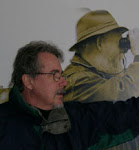
My Teaching Philosophy – Newly Revised
As part of a senior administrator application process, I was required recently to expound upon my “Teaching Philosophy” in a short essay. Thank goodness for old hard-drives and a compulsion to back-up files. And voila! Up came “My Teaching Philosophy” written some fifteen years ago in another state. A few nips and tucks and then back to other work.
What I wasn’t prepared for was that in this self-reflection I would see a very different teacher’s face looking back at me. Instead of time tested, knock ‘em dead print and lecture materials that I’d used for more than ten years, I saw dynamic electronic resources plucked from the infinite treasure trove freely accessible through Google.
Instead of stage worthy performance virtuosity, I saw facilitations of the expertise of my students and worldwide collegial partnerships through such agencies as
Instead of building fresh neuronal networks in new-to-college students, I was helping older, returning students restructure their denser neuronal networks into different patterns. My earlier Socratic classroom dramaturgy had mellowed to one that allowed both my students and me more time for consideration, genuine dialogue and changes of mind.
Although the “how I teach” has evolved significantly over the years, the “what I teach” relative to the primacy of the liberal arts really hasn’t changed. No matter what the subject, I still emphasize that nearly all contemporary human problems are more failures of imagination, introspection, observation, analysis/interpretation, common sense, cultural memory, integrity, moral outrage, courage to act, or compassion rather than insufficiencies of material means to solve them. And that the ability to absorb, critique and construct new knowledge is our best indicator of truly college-educated individuals. These are the competencies that engagement with the liberal arts provide. I fully agree with Cicero who said over two thousand years ago, "Not to have knowledge of what happened before you were born, is to be condemned to live your life as a child."
The three most significant indicators of my evolution as a teacher over the last fifteen years are 1) to write a “Lecture Epilogue” delivered to the student electronically a week after each class answering the “So what?” questions and including students’ contributions; 2) to focus on “learning by doing” by spending less time on what I am going to say in class and more time on imagining what the students could do to apply their prior learning and demonstrate their understanding of the material -- to become the change that I was envisioning; and 3) to project the learning beyond the classroom by maintaining an ongoing professional blog for my current and former students as well as my colleagues. This “Common-wealth: Art, Media and Western Culture” blog is my way of doing just that -- http://artmediawesternculture.blogspot.com/.
I also believe that every college class is a writing and critical thinking class and that every college teacher needs to model the highest level of effective communication. Monitoring those ends I wrote the expository writing-across-the-curriculum rubrics that appear on every
In this brave, new, electronically networked world we’re permitted to act more like teammates than competitors.



